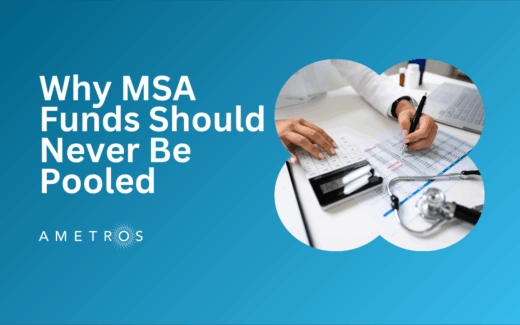When it comes to Medicare Set-Aside (MSA) funds, doing things by the book is more than just a good idea, it’s a necessity to maintain your Medicare benefits. These funds are meant to protect an injured worker’s future medical care and ensure compliance with Medicare’s guidance. Pooling MSA funds together across many injured workers (or “members”) might make operations easier for the administrator, but this practice poses serious risks to injured workers.
Five key reasons why MSA funds should never be pooled.
- CMS guidance clearly states MSA funds should be kept separate
The Worker’s Compensation Medicare Set-Aside (WCMSA) Reference Guide and the Self Administration Toolkit from CMS both require placing MSA funds in a “separate”, “interesting-bearing account,” not mingled with other members’ money. [WCMSA Reference Guide Section 17.2]. Pooling funds together violates this guidance and introduces confusion and compliance risks, especially if there’s ever an audit or dispute.
17.2 Interest-Bearing Account
You must deposit the total WCMSA amount (future medical treatment and future prescription drug treatment) in an interest-bearing account, separate from any other account such as personal savings or checking
- Pooling can eliminate FDIC insurance protections.
CMS recommends placing MSA funds in an account with FDIC insurance, which protects up to $250,000 per individual account holder.
“It must be an account that earns interest and should be insured by the Federal Deposit Insurance Corporation (FDIC).” Section 3 of Version 1.7 of CMS' toolkit called “Self-Administration and You: A Beneficiary Toolkit for Workers’ Compensation Medicare Set-Aside Arrangements (WCMSAs)”
When funds are pooled together into a single bank account for hundreds or even thousands of members, the FDIC insurance doesn’t scale. In fact, most pooled members may have virtually no protection if the bank fails, which could be a financial disaster. Pooling takes away the federal government’s FDIC guarantee to backstop your funds at the bank.
- You lose accountability
With pooled accounts, the only way to track your MSA balance is through the administrator’s internal systems. If their system crashes or the company dissolves, there’s no way to verify who owns what and your funds could become lost or unrecoverable.
CMS also emphasizes the importance of proper documentation in Section 17.5 of WCMS Reference Guide:
17.5 Annual Attestation and Record-Keeping
The administrator of the account will be responsible for keeping accurate records of payments made from the account. These records may be requested by CMS as proof of appropriate payments from the WCMSA account.
Without a clear, separate account, that level of accountability is impossible.
- Facing delays or barriers in accessing your funds
Some administrators invest pooled MSA funds in products like long-term CDs or bonds. This might seem like a smart approach, but it would be challenging if an unexpected medical bill comes up and there is a delay in accessing the funds. Your medical care should never be delayed because your money is locked in an investment product you didn’t approve.
This is especially important considering CMS’s guidance in Section 18.0 of the WCMS Reference Guide:
18.0 CMS’ Monitoring
CMS will not monitor the money spent from the WCMSA until the claimant becomes Medicare eligible (a beneficiary). However, if you have a WCMSA as part of your settlement, the WC related medical expenses should be paid from the WCMSA even before the claimant becomes a beneficiary. Medicare beneficiaries and claimants who are not yet beneficiaries follow the same reporting rules discussed in Section 17.5.
In other words, proper access to and use of MSA funds must be available from day one after the settlement, regardless of Medicare status.
- It complicates and risks misplacing your funds
Pooling funds across multiple banks or investment products can result in a logistical nightmare. This fragmentation increases the risk of loss, error, or delayed payments which is the opposite of what an MSA is supposed to do. The MSA is meant to be a secure nest-egg for all your future Medicare-covered, injury-related expenses.
At Ametros, we prioritize security and Medicare compliance
We believe your MSA funds must be safe, compliant, and accessible.
Here’s how we protect your funds:
- Your funds are never pooled. Each member’s MSA is placed in its own separate, interest-bearing checking account.
- Accounts are fully FDIC-insured. Each member has a separate account registered under their name and unique Social Security Number or Tax ID Number, ensuring federal FDIC protection up to $250,000.
- You’re always in control. Members can review their balances and expenses instantly through our secure online portal or mobile app.
- We follow CMS guidelines. From proper account setup to reporting, we focus on compliance, security, and delivering peace-of-mind.
- We’re part of Webster Bank (NYSE: WBS). Webster is one of the largest banks in America. We adhere to stringent bank-level security protocols, audits, testing, and more – all this to ensure that our members' funds and information remain safe and protected.
Injured workers deserve a professional administrator who puts them first and keeps them informed every step of the way. At Ametros, protecting our members is our top priority. Choosing Ametros as your professional administrator means more than just ensuring compliance; it means gaining access to the most trusted, post-settlement solution backed by deep expertise.
If you’re an injured worker considering a professional administrator, ask these four important questions to understand the location and security of your funds:
- What bank are my funds placed in?
- What type of account is it?
- Is the account titled under my name and my Social Security Number or Tax ID Number as the owner?
- Can you provide a statement directly from the bank – NOT from the administrator - showing my individual account?
At Ametros, we ensure full compliance with Medicare’s guidelines and provide injured workers with the peace of mind that their money is safe and they are taken care of for the long-term. With Ametros, it’s not just about managing MSAs, it is about protecting people and setting them up for a better life after settlement.


